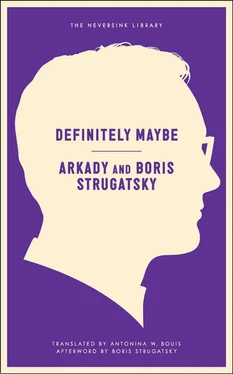“You mean that we’re dealing with some sort of elemental force? A natural phenomenon?”
“If you like,” Vecherovsky said.
“Well, really!” I spread out my hands, knocking over my tea and spilling it all over the table. “Damn!”
While I cleaned up the table, Vecherovsky continued lazily: “Try to recant epicycles, and try to put the Sun, rather than the Earth, at the center of things. You’ll see how it falls into place.”
I threw the wet rag into the sink.
“You mean you have a theory,” I said.
“Yes, I do.”
“Well, let’s hear it. By the way, why didn’t you tell us right away? While Weingarten was here?”
Vecherovsky’s eyebrows wiggled.
“You see, every new theory has a drawback—it always creates a lot of arguments, and I didn’t feel like arguing. I just wanted to assure you that you were faced with a choice and that each of you had to make that choice alone, on your own. Apparently, I didn’t succeed. And I guess my theory could have served as an additional argument, because its gist—in fact, the only possible conclusion that can be made from it—is that you now not only have no friends, but you also have no enemy. So perhaps I was wrong. Perhaps I should have gotten into an exhausting discussion, that would have made your position clearer. Things as I see them are like this…”
I can’t say that I didn’t understand his theory, but I can’t say that I fully grasped it either. I can’t say that this theory convinced me fully, but on the other hand everything that had happened to us fit into it nicely. More than that, everything that ever happened, was happening, and will ever happen in the entire universe fit into it—that was the theory’s weakness. It smacked of the statement that rope was simply rope.
Vecherovsky introduced the concept of the Homeostatic Universe. “The universe retains its structure,” that was his fundamental axiom. In his words, the laws of conservation of energy and matter were simply discrete manifestations of the law of conservation of structure. The law of nondecreasing entropy contradicts the homeostasis of the universe and therefore is a partial law and not a universal one. Complementary to this law is the law of constant reproduction of reason. The combination and conflict of these two partial laws are an expression of the universal law of the conservation of structure.
If only the law of nondecreasing entropy existed, the structure of the universe would disappear and chaos would reign. But on the other hand, if only a constantly self-perfecting and all-powerful intelligence prevailed, the structure of the universe based on homeostasis would also be disrupted. This, of course, did not mean that the universe would become better or worse—merely different—contrary to the principle of homeostasis, since a constantly developing intelligence can have but one goal: to change nature. That is why the gist of the Homeostatic Universe consists in maintaining the balance between the increase in entropy and the development of reason. That is why there are no and can be no supercivilizations, since the term supercivilization is used for intelligence developed to such a degree that it transcends the law of nondecreasing entropy on a cosmic scale. And what was happening to us now was nothing other than the first reaction of the Homeostatic Universe to the threat of humanity becoming a supercivilization. The universe was defending itself.
Don’t ask me, Vecherovsky said, why you and Glukhov became the first swallows of the coming cataclysm. Don’t ask me about the physical nature of the signals that disturbed the homeostasis in that corner of the universe where you and Glukhov undertook your research. In fact, don’t ask me about any of the mechanisms of the Homeostatic Universe—I know nothing about them, the way people know nothing about the functioning of the law of the conservation of energy. All processes occur in such a way as to conserve energy. All processes occur in such a way that in a billion years from now the work by you and Glukhov, when combined with the work of millions upon millions of other people, does not lead to the end of the world. Of course, it is not a question of the end of the world in general but of the end of the world as we observe it today, the world as it has existed for a billion years, the world that you and Glukhov, without even suspecting it, are threatening with your microscopic attempts to overcome entropy.
That’s sort of what I understood, though I’m not sure I got it completely right; I could be completely wrong. I didn’t even argue with him. It was bad enough without this, but looking at it this way made everything so hopeless that I just didn’t know how to react—why go on living? God! D. A. Malianov versus the Homeostatic Universe! This isn’t even being a bug under a brick. It’s not even a virus in the center of the Sun…
“Listen,” I said. “If that’s really the way it is, what is there to talk about? The hell with my M cavities. Choice! What kind of choice can there be?”
Vecherovsky slowly removed his glasses and rubbed the irritated bridge of his nose with his pinkie. He was silent for a very long, exhaustingly long time. And I waited. My sixth sense told me that Vecherovsky wouldn’t just drop me like this, to be devoured by his homeostasis; he would never have told me if there wasn’t some way out, some variant, some choice, goddamn it. And when he finished rubbing his nose, he put his glasses back on and spoke in a quiet voice:
“‘I was told that this road would take me to the ocean of death, and turned back halfway. Since then crooked, roundabout, godforsaken paths stretch out before me.’”
“Well?” I asked.
“Shall I repeat it?” Vecherovsky asked.
“Well, repeat it.”
He repeated it. I wanted to cry. I got up quickly, filled the teakettle, and put it on the range.
“It’s a good thing tea exists. Otherwise I’d be roaring drunk under the table by now,” I said.
“I prefer coffee.”
And then I heard a key turning in the lock. I must have turned white, or maybe blue, because Vecherovsky moved toward me and said quietly:
“Easy, Dmitri, easy. I’m here.”
I barely heard him.
In the foyer another door opened, clothes rustled, quick footsteps, Kaliam’s wild meows, and while I was still dumbstruck, I heard Irina’s breathless “Kaliamkins.” And then:
“Dmitri!”
I don’t remember how I got out into the foyer. I grabbed Irina, hugged her, held her (Irina, Irina!), inhaled her familiar perfume—her cheeks were wet; she was muttering something strange: “You’re alive, thank God. And I thought… Dmitri!” Then we came to our senses. Anyway, I did. I mean, I fully realized that she was there and what she was saying. And my amorphous wooden terror was quickly replaced by a concrete everyday fear. I set her down, stepped back, looked into her tear-stained face (she wasn’t even wearing makeup):
“What’s wrong, Irina? Why are you here? Is it Bobchik?”
I don’t think she was listening to me. She was grabbing my hands, feverishly looking into my face with her wet eyes, and repeating:
“I was going crazy… I thought I’d be too late… What’s going on?”
Holding hands, we squeezed into the kitchen. I seated her on my stool, and Vecherovsky poured her some strong tea straight from the pot. She drank it greedily, spilling half of it on her coat. She looked horrible. I barely recognized her. I started shaking, and I leaned on the sink.
“Something happen to Bobchik?” I asked, barely managing to make my tongue work.
“Bobchik?” she repeated. “What does Bobchik have to do with this? I almost went crazy worrying about you. What’s been going on here? Were you sick?” She was shouting. “You’re as healthy as a bull!”
Читать дальше












